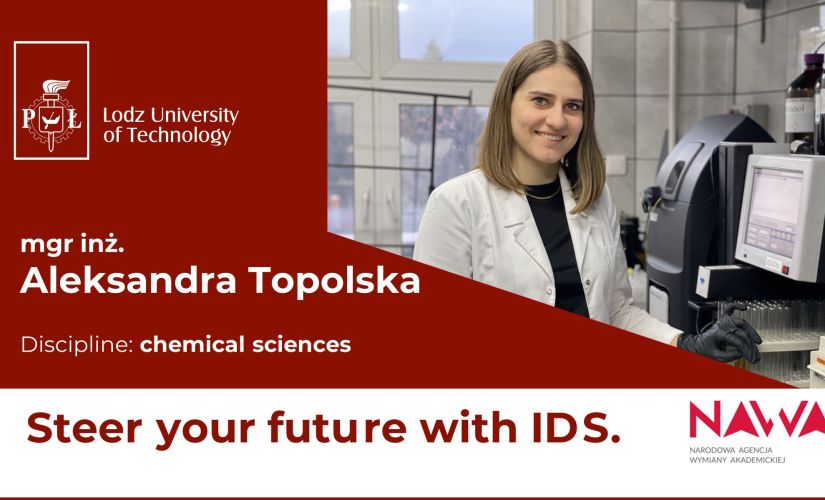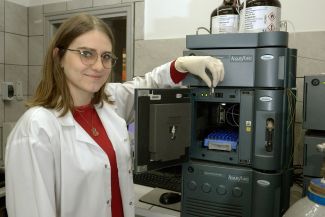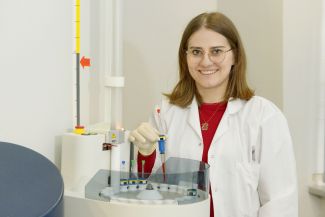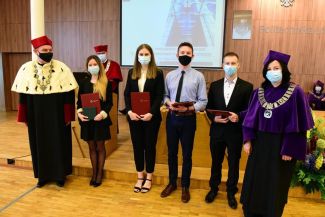What fascinates you about chemistry?
What inspires me most about chemistry is that it is literally everywhere. We deal with it every day: when we bake a cake, when we cry cutting onions, when we wash windows with vinegar, baking soda and lemon, when we paint our nails, when we brush our teeth, when we take medicine, or when we listen to the news about water contamination or air pollution. Chemistry is much more than the periodic table of elements.
What is the research objective of your doctorate?
I am writing my thesis in the discipline of chemical sciences and it concerns new strategies for the dearomatisation of heteroaromatic compounds. My research aims to apply a widely used, 2021 Nobel Prize-winning synthetic tool, asymmetric organocatalysis. This methodology enables the development of easy pathways to construct a variety of enantiomerically enriched organic molecules with high biological potential. The research group in which I carry out my research, headed by Prof. Lukasz Albrecht, focuses primarily on the development of new synthetic methods using small, chiral organic molecules as catalysts in the synthesis of various organic compounds.
What equipment do you work with in the laboratory?
My research consists of several steps. I synthesise starting substrates, carry out optimisation studies on selected reaction pathways, using the spectroscopic methods necessary to identify the products obtained, and check the range of applicability of the synthetic pathway developed. To this end, I require knowledge of chromatographic techniques (FC, TLC), the ability to analyse compounds using NMR and MS techniques, and familiarity with HPLC and UPCC chromatography. As far as the ratio of laboratory work to theoretical work is concerned, there is a significant advantage to this experimental work.
Where can the results of your research be applied?
The uniqueness of asymmetric organocatalysis is demonstrated by its industrial applications. In recent years, asymmetric organic catalysis has played a fundamental role in the chemical, polymer, petrochemical and pharmaceutical industries. It has a number of advantages, the most important being the durability of the organocatalysts and their insensitivity to the presence of oxygen and water. Their negligible toxicity is also an important feature, which, from an ecological point of view, facilitates disposal and increases operational safety. These catalysts are commercially available and the cost of their production is low, mainly due to the existence of many of their enantiomerically pure precursors in natural sources. Moreover,
their efficiency, reliability, and scientific and application potential demonstrate the high attractiveness of organocatalysis in the synthesis of complex target compounds. The benefits of this methodology include reduced process costs, reduced waste generation, energy savings, as well as reduced time required to obtain a specific product.
What types of chemical compounds are you particularly interested in and where are they located?
There is great interest among scientists in the synthesis of heterocyclic compounds exhibiting specific biological activity, which is primarily due to the possibility of using them as pharmaceuticals or plant protection agents. I am primarily interested in heterocyclic compounds containing a furan ring in their structure. Examples of pharmaceuticals containing a furan ring include furagin, which fights bacterial infections of the urinary tract; furosemide, which is used to treat acute left heart failure, pulmonary oedema and acute renal failure; and ranitidine, which is commonly used to treat gastric and duodenal ulcers.
What development opportunities does IDS offer?
Definitely improving language competence. We participate in team projects, which are course credits, so we come into contact with a lot of PhD candidates studying different subjects. We get to know each other on occasion and discuss our own research problems. Broadening horizons - attending scientific conferences allows us to meet many interesting, more experienced scientists working on similar research topics. In doing so, we create our own network of contacts, which may result in future collaborations.
In addition, it is worth mentioning that there are scholarships and grants for internships abroad. I am going to Madrid for three months, with funding from the NAWA programme. I will be doing a research internship with a team working on a similar research topic. I also hope that the trip will inspire me as a researcher, and the collaboration with a research university in Madrid will certainly enhance the scientific value of my PhD.




